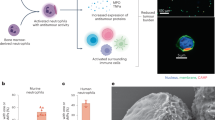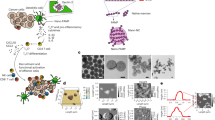Abstract
We have investigated the inhibitory effect on experimental or spontaneous lung metastases of polypeptides which contain repetitive structures of the Arg-Gly-Asp (RGD) or Tyr-Ile-Gly-Ser-Arg (YIGSR) sequence derived from adhesion molecules, and studied their biological characterisation after administration. In the spontaneous metastasis model, multiple intravenous (i.v.) administrations of poly (RGD) and poly (YIGSR) resulted in a reduction of lung tumour colonies, although the monomer peptides, RGD or YIGSR, had no effect under these conditions. The treatment with poly(RGD) substantially prolonged the survival time for mice injected i.v. with B16-BL6 cells as compared to the treatment with RGD and random poly(R, G, D). Tumour cell adhesion to the fibronectin-substrates was remarkably inhibited by adding poly(RGD) freely in solution. Poly(RGD) was found to inhibit completely the ability of platelets to enhance tumour cell adhesion to fibronectin-substrate and tumour cell-elicited platelet aggregation in vitro, but poly(R, G, D) had no such effect. We also found that poly(RGD) led to a decrease in the arrest and retention of tumour cells after its co-injection with radiolabelled tumour cells and that the radiolabelled polypeptide can be at least decomposed into small fragments during circulation. Poly(RGD) was found to be still active in inhibiting experimental lung metastasis even when the contributions of NK cells or macrophages were removed from this system after pretreatment with anti-asialo GM1 serum, 2-chloroadenosine or carrageenan. The results indicate that the poly(RGD)-mediated inhibition of tumour metastasis may be due to the interference of the adhesive interaction of tumour cells with a specific site in the target organs. Derivatives of polypeptides which contain RGD and/or YIGSR sequences derived from cell adhesion proteins may thus provide a promising approach for the control and prevention of cancer metastasis.
This is a preview of subscription content, access via your institution
Access options
Subscribe to this journal
Receive 24 print issues and online access
$259.00 per year
only $10.79 per issue
Buy this article
- Purchase on Springer Link
- Instant access to full article PDF
Prices may be subject to local taxes which are calculated during checkout
Similar content being viewed by others
Author information
Authors and Affiliations
Rights and permissions
About this article
Cite this article
Saiki, I., Murata, J., Iida, J. et al. Antimetastatic effects of synthetic polypeptides containing repeated structures of the cell adhesive Arg-Gly-Asp (RGD) and Tyr-Ile-Gly-Ser-Arg (YIGSR) sequences. Br J Cancer 60, 722–728 (1989). https://doi.org/10.1038/bjc.1989.347
Issue Date:
DOI: https://doi.org/10.1038/bjc.1989.347
This article is cited by
-
The monoclonal antibody SM5-1 recognizes a fibronectin variant which is widely expressed in melanoma
BMC Cancer (2006)
-
Anti-metastatic gene therapy utilizing subcutaneous inoculation of EC-SOD gene transduced autologous fibroblast suppressed lung metastasis of Meth-A cells and 3LL cells in mice
Gene Therapy (2001)
-
Diminution of 37-kDa laminin binding protein expression reduces tumour formation of murine lung cancer cells
British Journal of Cancer (1999)
-
Triflavin, an Arg-Gly-Asp-containing peptide, inhibits B16-F10 mouse melanoma cell adhesion to matrix proteins via direct binding to tumor cells
Journal of Biomedical Science (1996)
-
Adhesive receptors expressed by tumor cells and platelets: novel targets for therapeutic anti-metastatic strategies
Medical Oncology (1995)



